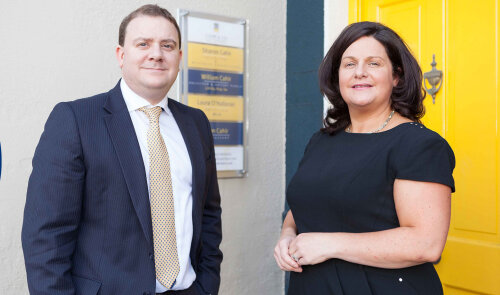Best Nursing Home Abuse Lawyers in Ennis
Share your needs with us, get contacted by law firms.
Free. Takes 2 min.
List of the best lawyers in Ennis, Ireland
About Nursing Home Abuse Law in Ennis, Ireland
Nursing home abuse in Ennis, Ireland covers physical, emotional, sexual and financial abuse, as well as neglect or poor care that causes harm to an older person or a vulnerable adult living in a residential care setting. Legal protections and remedies come from a mix of criminal law, civil law, and regulatory standards. Criminal law applies where conduct amounts to an offence - for example assault or theft. Civil law allows a resident or their representative to seek compensation for harm caused by negligence or breach of contractual or statutory duties. Regulatory bodies inspect and enforce minimum standards of care and investigate complaints about the quality and safety of care provided in nursing homes.
Why You May Need a Lawyer
A solicitor who specialises in elder law or personal-injury and clinical-negligence cases can help you navigate complex legal, medical and regulatory systems. Common situations where legal help is needed include:
- Suspected physical abuse, sexual assault or criminal conduct involving a resident, where you need to ensure a criminal investigation is started and coordinate victim protection.
- Serious neglect or repeated failures of care leading to injury, deterioration or death, where you may want to bring a civil claim for compensation.
- Financial abuse - for example misappropriation of a resident-s funds or undue influence - where you may require legal steps to recover funds and protect the resident-s assets.
- Problems obtaining medical records, care plans or other evidence needed to support a complaint or claim.
- Complex disputes about capacity, power of attorney, guardianship or who is authorised to make decisions for the resident.
- Complaints to regulators or public bodies that stall, where legal representation can help escalate the case or prepare for court proceedings.
Local Laws Overview
Several legal and regulatory frameworks are relevant to nursing home abuse cases in Ennis:
- Criminal law: Acts such as assault, sexual offences and theft are dealt with by An Garda Siochana and the criminal courts. If an allegation suggests a criminal offence, it should be reported to the Gardaí for investigation.
- Civil law: A resident harmed by negligent care may bring a civil action against the nursing home operator, individual staff members or contracted providers. Civil remedies commonly include damages for pain and suffering, financial losses and, in some cases, aggravated or exemplary damages.
- Regulatory oversight: The Health Information and Quality Authority - HIQA - sets standards for the regulation and inspection of residential care services for older people. HIQA inspects facilities, publishes inspection reports and can take regulatory action where standards are not met.
- Health services and safeguarding policies: The Health Service Executive - HSE - publishes safeguarding guidance and operates local safeguarding processes. Allegations of abuse against vulnerable adults are managed through local HSE safeguarding teams in conjunction with other agencies.
- Capacity and decision-making: Legal arrangements about who may act for a resident - such as a power of attorney or court-appointed decision-maker - affect who can bring complaints, access records or instruct solicitors on behalf of a resident. Questions about capacity should be handled sensitively and in line with relevant Irish laws and medical practice.
- Data protection and records access: Residents and their authorised representatives have rights to access personal and medical records under data protection rules and healthcare record access procedures. Those rights may be relevant when gathering evidence.
Frequently Asked Questions
What exactly counts as nursing home abuse?
Nursing home abuse includes any action or failure to act that causes harm, distress or loss to a resident. This covers physical harm, emotional or psychological abuse, sexual abuse, financial exploitation and neglect - for example failure to provide necessary food, medication, hygiene care or medical attention. Abuse can be deliberate or arise from poor management and understaffing.
Who should I contact first if I suspect abuse?
If a resident is in immediate danger or has suffered a serious injury, contact An Garda Siochana immediately. For non-emergency concerns, notify the nursing home manager in writing and raise the issue with the person responsible for the resident-s care. You should also contact the local HSE safeguarding team and consider making a formal complaint to HIQA so the regulator can inspect and investigate.
Can I see the resident-s medical and care records?
Residents and their authorised representatives generally have a right to access their health and care records. If you are a next of kin or hold an appropriate power of attorney, request access in writing from the nursing home and the resident-s treating clinicians. If access is refused, a solicitor can advise on the best steps to compel disclosure and on data protection rights.
How do I collect evidence of abuse?
Document everything - dates, times, what happened and who was present. Take photographs of injuries or unsafe conditions, keep copies of medical reports, prescriptions and care plans, and collect witness statements from visitors, other residents or staff. Preserve any financial records that suggest misuse of funds. Early documentation strengthens any complaint or legal claim.
Will the nursing home be notified if I complain to HIQA or to the HSE?
Regulators and public bodies will usually inform the nursing home as part of their inquiry so the operator can respond. If you are concerned about retaliation or further harm, tell the investigating body so they can take appropriate measures to protect the resident while enquiries are carried out.
How long do I have to bring a legal claim for abuse or negligence?
Time limits apply to civil claims. In many cases you will need to start proceedings within two years from the date you became aware of the injury or loss, but exceptions and alternative time limits can apply depending on circumstances. Because limitation rules are strict, talk to a solicitor promptly to protect your legal rights.
Can staff be criminally prosecuted?
Yes. Where conduct amounts to a criminal offence - for example assault, sexual offences, fraud or gross neglect - the Gardaí may investigate and pursue criminal charges. Criminal proceedings are separate from civil claims and regulatory action. A solicitor can help when engaging with both criminal and civil processes.
What remedies can I seek if abuse is proven?
Possible remedies include an apology, changes to the resident-s care plan, regulatory sanctions against the facility, criminal prosecution of offenders, and civil damages for pain, suffering and financial loss. In urgent situations the courts can also grant orders to remove a resident or require emergency medical treatment.
Can I get legal aid to pursue a case?
Legal aid may be available in some circumstances, depending on income, the nature of the case and whether it is suitable for state-funded assistance. A solicitor or Citizens Information can advise whether you qualify for civil legal aid or other forms of support.
What should I do if the resident lacks capacity to make decisions?
If the resident lacks capacity, determine whether there is a valid power of attorney or a court-appointed decision-maker who can act on their behalf. If there is no authorised representative, you should raise safeguarding concerns with the nursing home and the HSE so appropriate protective steps can be taken. A solicitor experienced in capacity and elder-law matters can advise on who may bring a complaint or claim for the resident.
Additional Resources
When dealing with suspected nursing home abuse in Ennis, the following bodies and organisations are commonly involved in advice, reporting and oversight:
- Health Information and Quality Authority - HIQA - regulator for residential care standards and inspections.
- Health Service Executive - HSE - local safeguarding teams and health services.
- An Garda Siochana - for reporting criminal conduct and seeking immediate protection.
- Citizens Information - general guidance on rights, complaints and public services.
- Data protection authorities and patient advocacy services - for help accessing medical records and protecting privacy.
- Local solicitors with expertise in elder law, personal injury and clinical negligence - for legal advice and representation.
Next Steps
If you suspect nursing home abuse, consider the following practical steps:
- Ensure immediate safety. If the resident is in danger or needs urgent medical attention, call the Gardaí or emergency services right away.
- Record the facts. Keep detailed notes of incidents, dates, times, staff names, and any witnesses. Take photographs and gather medical documents and financial records if relevant.
- Report concerns internally. Raise the issue in writing with the nursing home manager and keep a copy of your complaint.
- Notify authorities. Report the matter to the HSE safeguarding team and to HIQA so the incident can be inspected. Contact the Gardaí for suspected criminal conduct.
- Get medical evidence. Ask a doctor to examine the resident and prepare a medical report that documents injuries or neglect.
- Seek legal advice. Consult a solicitor experienced in nursing home abuse, elder law or clinical negligence as soon as possible to understand your options and to preserve evidence. Ask about time limits and whether you may qualify for legal aid.
- Protect finances and decisions. Check whether a power of attorney or other legal arrangements exist for the resident and secure bank accounts or assets if financial abuse is suspected.
- Consider support. Look for local advocacy and support services for older people and their families to help manage care decisions, emotional support and practical arrangements.
Taking prompt, well-documented action reduces further risk to the resident and improves the prospects of a successful resolution. A solicitor can help you prioritise steps, prepare complaints and represent the resident-s interests before regulators, criminal investigators and civil courts.
Lawzana helps you find the best lawyers and law firms in Ennis through a curated and pre-screened list of qualified legal professionals. Our platform offers rankings and detailed profiles of attorneys and law firms, allowing you to compare based on practice areas, including Nursing Home Abuse, experience, and client feedback.
Each profile includes a description of the firm's areas of practice, client reviews, team members and partners, year of establishment, spoken languages, office locations, contact information, social media presence, and any published articles or resources. Most firms on our platform speak English and are experienced in both local and international legal matters.
Get a quote from top-rated law firms in Ennis, Ireland — quickly, securely, and without unnecessary hassle.
Disclaimer:
The information provided on this page is for general informational purposes only and does not constitute legal advice. While we strive to ensure the accuracy and relevance of the content, legal information may change over time, and interpretations of the law can vary. You should always consult with a qualified legal professional for advice specific to your situation.
We disclaim all liability for actions taken or not taken based on the content of this page. If you believe any information is incorrect or outdated, please contact us, and we will review and update it where appropriate.









